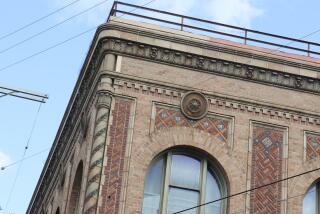Revolutionary War town in revolt over synagogue
Reporting from Litchfield, Conn. — The scenic village green of Litchfield has long symbolized the charms of Connecticut small-town life. Settled in 1721, it hosts tourists drawn by its Revolutionary War history: Litchfield served as a “safe town” for Continental forces seeking refuge while the British occupied New York City.
But this fall, the celebrated tourist town of about 8,500 will receive publicity for quite a different reason: charges of religious discrimination.
This summer, a federal judge ruled that sufficient evidence of “discrimination against Jewish people” may exist, warranting a trial over the Borough of Litchfield’s denial of a Hasidic group’s application to build a synagogue on the west end of Litchfield Green. The ruling virtually guarantees a trial this fall on a controversy that has deeply divided the town.
In December 2007, the borough’s historic district commission, after contentious hearings, denied an application by Chabad Lubavitch of Litchfield County to extensively renovate a historic house just below the green. The group’s plans included a synagogue, living space for Rabbi Joseph Eisenbach and his large family and a swimming pool for the Chabad group’s popular summer camp.
Among other objections, the commission cited plans to replace a single front door with double doors and said that the addition would dwarf the existing historic home and others in the neighborhood.
But it was the tone of the commission meetings that now forms the core of Chabad’s federal suit.
At one meeting, commission Chairwoman Wendy Kuhne objected to Chabad’s proposed use of a Star of David on the synagogue by stating that it “may not comply with the [historic] district.” In the uproar that followed, Kuhne was depicted on a local website wearing a Nazi uniform, and she recused herself from the vote on the synagogue.
Another commission member, according to Chabad’s complaint, said of the group’s plans to use facing stone from Israel, “Stone from Israel? We’ll have to get the whole town out for this one.”
Another commissioner said that Chabad’s plans would “turn Litchfield into a factory town.” A lawyer representing historic-district homeowners suggested Chabad’s plans should be “reviewed as if it were a strip joint.”
Chabad’s federal suit contends that, under the U.S. and Connecticut constitutions and federal law, the borough violated Chabad’s religious freedom and denied it the right to expand its building to the same size as Christian churches in the historic district.
U.S. District Judge Janet C. Hall wrote in her July ruling on pretrial motions, “Several statements were made in what appear to be meetings of the [historic district commission] that may contain evidence of discrimination directed against Jewish people in general and the Chabad in particular.”
In their replies in federal court, the commission and its attorney, James Stedronsky, argue that the panel simply was applying the standards that any project in the historic district must observe.
Historic district commission members did not return calls requesting interviews. But in depositions, the commission cited evidence supporting its claim that Eisenbach has few local followers, that his Sabbath services are poorly attended and that his plans for a personal residence and a swimming pool are too grandiose for the site.
“This case is not about the construction of a synagogue,” Stedronsky said recently. “It’s about the construction of a personal palace for Rabbi Eisenbach, complete with a 4,500-square-foot apartment and an indoor swimming pool big enough to serve a summer camp.”
The tensions between commission members and the rabbi do not appear to have diminished with time.
In April, when Kuhne appeared for her deposition in Litchfield, she left the room when Eisenbach arrived, stating, according to Chabad’s complaint, “I will not be in the same room with that man.” Kuhne was deposed on another day, and then only after Eisenbach agreed to sit in a corner of the room.
Litchfield has seen plenty of municipal spats in its history. That’s inescapable for a place 289 years old. But it’s also known plenty of peace. As the town’s website notes, the Rev. Dan Huntington, a Congregational minister in the town from 1798 to 1809, wrote upon his arrival here:
“A delightful village on a fruitful hill, richly endowed with schools both professional and scientific, with its venerable governors and judges, with its learned lawyers, and senators both in the national and state departments and with a population both enlightened and respectable, Litchfield was now in its glory.”
More to Read
Sign up for Essential California
The most important California stories and recommendations in your inbox every morning.
You may occasionally receive promotional content from the Los Angeles Times.










